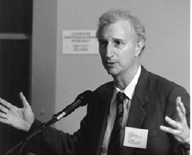|

Democracy and Cyberspace: First Principles
Friday, May 8, 1998
7:30-9:30 pm
Speaker: Ira Magaziner
Respondents: Benjamin Barber and Joshua Cohen
Moderator: Mitchel Resnick
Summaries
[These are edited summaries, not complete transcripts.]
|
[The complete text of Ira Magaziner's keynote address is also available.]
Ira Magaziner: The spread of information technology has caused
a period of fundamental economic transformation like that which
occurred during the Industrial Revolution. Over the next couple of
decades, economies are going to be dependent upon information
technology for their economic growth. Coping with this will require
fundamental changes in our commercial, legal, economic, and
political paradigms. Let me suggest a couple of principles that
should guide those changes.
|  |
| |
- The digital economy moves too quickly and requires too much
flexibility for the processes of government to be successful in
regulating it, so private actors will lead rather than governments.
- The Internet Economy should be a market-driven because
traditional reasons for regulation are unnecessary, at the same time
as there will be the huge competition to build out the infrastructure.
Since the converged environment of the telecommunications,
broadcast and the Internet should be a market-driven environment,
we will also have to go through considerable de-regulation.
|
- When government does act to create uniform commercial code for
the conduct of contracts, the actions ought to be precise, uniform
and transparent.
- Whatever we do needs to take cognizance of the nature of
information technology. It changes rapidly, so policy needs to be
technology-neutral, or it'll be outmoded before it's enacted. It is also
de-centralized, so attempts to centrally control privacy or content are
impossible, even if they were desirable. A better model is to
empower people to make their own decisions and protect themselves
in these areas.
- This is the first medium and marketplace that is global from the
very beginning, so you need a global framework.
| |
| |
Fundamental challenges that remain include addressing the effect of
the digital economy on relationships between the rich and poor in
this country and around the world. There are also going to be tens of
millions of jobs lost and created. But if we don't have a sufficient
re-training programs in this society, our people will not be able to
take the new jobs.
The final word I'll leave you with is that we have to be very humble
because we don't fully understand it. We need to keep a very
broad, consultative process going and enough flexibility to
keep changing as the technology and the market teaches us things.
|
[The complete text of Benjamin Barber's response is also available.]
Benjamin Barber: I welcome the opportunity to talk with this
interesting group of Republican thinkers who have joined us to talk
about the marketplace and its virtues. As in the l9th century
Industrial Revolution, those who made that revolution spoke the
powerful language of laissez-faire and said that government should
not mess up the wonderful new cartel-economy being developed.
Caution is needed, because we don't know what's going to happen.
But we shouldn't turn the development of the new technologies
over to a marketplace whose effects we do know, and whose
objectives we understand well enough. I'm a capitalist, and I
have no problem with the motivation of the marketplace being profit.
But it is lunacy to think that we are being cautious by turning our
precious information, media and communications over to the private
marketplace for profit, greed and private shareholders to arbitrate
what will happen to them.
|  |
| |
The one word I did not hear in Ira's discussion was "democracy."
He talked about "bureaucracy," "government," "them," "it." You
wouldn't know that the inefficient and inflexible institutions that we
need to get rid of are our democratic institutions, our elected
representatives, and the institutions we have for deliberating about
how this new technology might be used as a public utility. Consider
for a moment how it has come to pass in traditional broadcast media
that the public utilities that we owned and licensed to the private
sector have to be bought back by us during elections for billions of
dollars, bankrupting us and forcing our politicians to cut all sorts of
nasty deals to raise the money?
The most dangerous thing in our society is the ideology of
privatization. Our political liberty consists of our capacity to join
together to make tough choices about the kind of world we want to
live in and the kinds of public utilities we want. Consumers make
private choices about their private needs, while citizens make
choices about the public needs. We have public institutions and
government to make the tough choices and deal with the social
consequences of private choices. We can't make choices about how
the 'Net will be used for cultural, educational, civic and democratic
uses unless we make those choices in public as citizens. What we
do as consumers on the 'Net is utterly irrelevant to the fundamental
questions of what the role of the new media will be in our larger
society.
|
Mitchel Resnick: There's nothing more boring than a respondent who just blandly agrees with everything the speaker said. I really look forward to the discussion between Benjamin Barber and Ira Magaziner.
|  |
 |
[The complete text of Joshua Cohen's response is also available.]
Joshua Cohen: I come at this issue as a web-provider and a
political theorist who has written on issues of democracy and
freedom of expression, and tried to combine egalitarian concerns
about fair access with strongly libertarian hostility to content
regulation. I come with the question, how can we preserve
democratic political culture in this environment?
Like Ira Magaziner, I will state some principles that come out of
reflection on the nature of this medium and my commitment to
preserving a democratic political culture.
|
My first principle is "don't regulate content." Although speech can
be injurious and harmful, open expression is essential to democracy.
As Brandeis pointed out, the best way to combat the harms of
speech is with more speech. We should draw a distinction between
restricting speech on grounds of its content, or fostering speech on
important issues because of its essential role in democracy. We also
shouldn't condemn content regulation by government and then
welcome all the proliferating schemes of private regulation; the best
way to substitute for the Communication Decency Act is not with a
bunch of software filters produced by private producers.
|
|
|
If you condemn content regulation because of Brandeis' principle
that the best way of combating the harms of speech is with more
speech, then you need to ensure that there is more speech out there
to combat those harms of speech, and there's no guarantee that the
market provides that, including this particular market.
| |
|

This brings me to a second principle, which is "ensure fair access."
Citizens have two roles in a democracy. They need to be both
informed audiences and active participants. When we think about
enabling access, we should think more about the participant-role.
It's important to provide access to the resources that people need to
create content, such as equipment, training and support staffs for
things like community networks. You give fair access to people to
become participants, and you don't have to worry about the
diversity of ideas on the 'Net. The people will combat the harms of
speech with more speech.
I end up in exactly the same way as Ira Magaziner, on a cautionary
note of "be careful and attentive." Whatever we do, be careful. This
medium is changing incredibly fast, so restrictive regulations are
likely to be irrelevant quickly or even extremely damaging. |
 |
[The complete text of Magaziner's reply to Barber and Cohen is also available.]
Ira Magaziner (Reply to Respondents): The fundamental question that Mr. Barber raised is correct. I wouldn't want to be construed as saying that governments are not there to play important democratic roles. I think that the distinction that he
makes between the civic and consumer role is good, and both are
important. I agree that there are civic roles where we should act
collectively through the democratic institutions of government.
Certainly.
I also favor the public use of the airwaves for election campaigns,
because it would take a very high percentage of the money out of
politics and allow communications to take place in a way that would
be healthier. The influence of money in politics, both in the
campaign and lobbying processes, is probably the greatest threat we
have to our democratic institution right now. In any campaign,
commercial advertising or political, when one side can outspend the
other 50 to 1, it makes an uneven fight in trying to reach public
opinion.
Finally, free and fair-access is absolutely crucial, and I should have
put more emphasis on it in my remarks. The Internet provides a
tremendous opportunity for increasing access, and that's one of the
real strengths that can contribute to the democracy.
|
[The complete text of the disussion is also available.]
Discussion Highlights
Andre Schwartz: Regarding the supposedly-libertarian culture on
the 'Net, there's the issue that any policy about the 'Net has to deal
with free speech and privacy. This means that it's very difficult not
to be a libertarian, since the moment we advocate a decency act or
regulations on cryptography, you leave the realm of acceptable
politics. Now, when you've been told that you agree with
libertarians, first comes denial, then rage, then bargaining, and then
acceptance.
Joshua Cohen: How do you achieve fair access in an environment
in which there is this kind of hostility to any kind of public
regulation? The market is not going to provide fair access by itself,
so what are the policy measures that we need? I don't think we can
take fair-access seriously and say, "No, don't regulate it." I think
that there's a fundamental tension between saying de-regulation and
saying fair access. It's a very hard to figure out how you ensure
fair access to people, both as audience and as speaker, without
regulating content and without doing things that, given the rapidity
of the changes in the technology, are just stupid. But the fair access
is more than just a legitimate public policy value. It's a
fundamental, constitutive element of democracy. If we don't have a
solution to the problem, then we're in real trouble. I don't think
anybody does have a solution yet.
| |
| |
Benjamin Barber: The cost of access is also a lot more than just
computers. One of the problems I have is that people think
hardware and hard-wiring will solve access problems. Access to a
computer requires life-long literacy, life-long education, a capacity
to use the language, and it depends on the quality of our educational
system. I also worry about having space and money for local
service. Money counts, and there are people with money who are
creating programming that squeezes out other programs. It's about
merchandising and marketing. It's about the way in which the
private economy is currently dominated by giants who have,
through vertical integration, connected merchandising, the
fabrication of needs, the development of entertainment and news,
and the blurring of knowledge and information. We need to deal
with those issues in the private sector, and to realize that believing
that a local cable show is going to provide an adequate answer to the
Disney corporation is naiveté that could lead to the loss of our liberty
and democracy.
|
Ira Magaziner: We don't say that government should have no
responsibility whatsoever, and I think the fair access issue is one
where we have some responsibility. But it's a fair criticism to say
that we don't have it figured out and haven't done it well enough.
There are government roles that need to be played. The free part of
the Internet and the educational part of the Internet can co-exist with
the commercial part and grow very rapidly. You're not going to
have to pay to see most of your Internet access. And I think the
community bulletin-board types of things will become widespread.
It won't just be your geographic community. You will form
communities based around your interests, with people from
around the world that have common interests.
| |
|